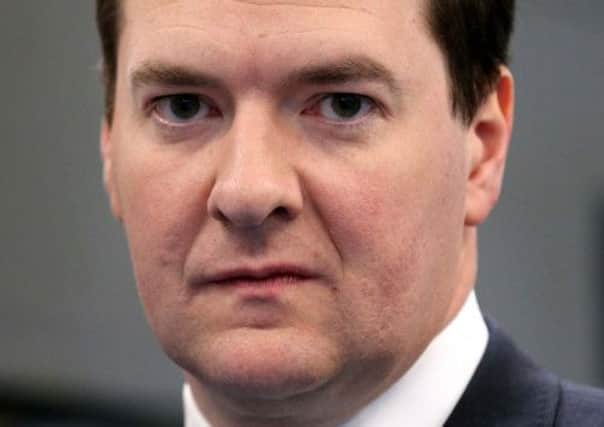Britain dodges triple-dip recession


A strong showing from the services sector and surging demand for energy as households ramped up their heating offset some of the impact of the snow at the start of the year, helping the UK pull back from the brink of its third recession since 2008.
The figure will relieve some of the pressure on Mr Osborne to rethink his austerity policy, following recent warnings from the International Monetary Fund (IMF) and last week’s move by rating agency Fitch to strip the UK of its AAA rating.
Advertisement
Hide AdAdvertisement
Hide AdBut the better-than-expected growth in gross domestic product (GDP) did little to ease fears that the economy is flat-lining, with economists warning the bounce back was relatively “feeble” given the drop at the end of last year.
Mr Osborne said: “Today’s figures are an encouraging sign the economy is healing. Despite a tough economic backdrop, we are making progress.”
“We all know there are no easy answers to problems built up over many years, and I can’t promise the road ahead will always be smooth, but by continuing to confront our problems head on Britain is recovering and we are building an economy fit for the future,” he added.
The pound rose sharply after the gross domestic product (GDP) data, gaining 1% against the US dollar.
But some economists urged caution over the figures.
Advertisement
Hide AdAdvertisement
Hide AdMark Littlewood, director general at the Institute of Economic Affairs (IEA), said: “We are in danger of meagre growth becoming the new normal.”
Vicky Redwood, of consultancy Capital Economics, said the figures offer hope the economy is moving in the right direction, but added: “In any normal recovery, a 0.3% expansion would be considered quite feeble, particularly after a similar-sized fall in the previous quarter.
“The recovery still faces significant obstacles ahead, with households still experiencing falling real pay and policymakers still struggling to get bank lending to rise.”
The first estimate from the Office for National Statistics (ONS) comes after a 0.3% contraction in the final quarter of 2012, which had left the economy under threat of a triple-dip.
Advertisement
Hide AdAdvertisement
Hide AdAnother quarter of falling output would have seen the UK enter a technical recession.
Most economists had been expecting growth of just 0.1%, although Rob Carnell at ING Bank cautioned the first estimate is based on “scant real data”.
It takes into account only 44% of total GDP output and is subject to change in future revisions, with updated figures due on May 23.
The ONS said the powerhouse services sector - which accounts for more than three quarters of GDP - grew by 0.6% between January and March, driven by 1.1% growth in the retail, hotels and restaurant trades sector.
Advertisement
Hide AdAdvertisement
Hide AdThere was also a strong boost from transport, storage and communications, which saw growth of 1.4%.
Surging demand for electricity and gas during the cold weather saw output from the energy supply sector rise 0.5%, according to the ONS.
While sales in the retail sector fell amid the snow in January and March, a strong February helped it notch up growth of 0.3% overall in the quarter.
But fears remain over the strength of the recovery, with key sectors such as construction and manufacturing still well below the peak in 2008.
Advertisement
Hide AdAdvertisement
Hide AdConstruction activity plunged by 2.5% in the first quarter and still remains 18.1% below pre-financial crisis levels.
Production and manufacturing edged 0.2% higher at the start of the year, but are also significantly down on 2008 - by 13.4%.
The economy as a whole is 2.6% below the 2008 peak, despite improvements from the services sector, which is 0.8% higher than five years ago.
With GDP only 3.7% higher than it was in the trough of the 2009 recession, Mr Osborne still faces a long haul in getting the UK back on track.
Advertisement
Hide AdAdvertisement
Hide AdShadow chancellor Ed Balls said the Coalition government had overseen the “slowest recovery for over 100 years” and called for “urgent action to kick-start our economy”.
He added: “The longer we continue to bump along the bottom the more long-term damage will be done. Britain’s struggling families and businesses cannot afford another two years of this.”
Mr Osborne yesterday beefed up his flagship Funding for Lending (FLS) scheme yesterday in an effort to help cash-starved businesses and spur on growth.
Banks are being offered an up to 10-fold increase in the cheap funding they can access in return for extending loans to smaller firms under the FLS revamp.
Advertisement
Hide AdAdvertisement
Hide AdIt is also to be opened up to non-bank lenders such as invoice finance houses and leasing firms that provide around £20 billion of working capital to small businesses, and will be extended for a year to January 2015.
Economists are looking to incoming Bank of England governor Mr Carney to inject some radical thinking into how the recovery can be spurred on when he starts in July.
Policymakers have held off from pressing the button on more economy boosting measures amid worries over the impact on the pound after it plunged in value at the start of the year, while inflation has also risen to its highest level in nearly a year at 2.8%.
The Bank saw its remit overhauled in the Budget to officially give it more flexibility in targeting inflation at 2%, but today’s figures have reduced the urgency for it to act ahead of Mr Carney’s arrival.